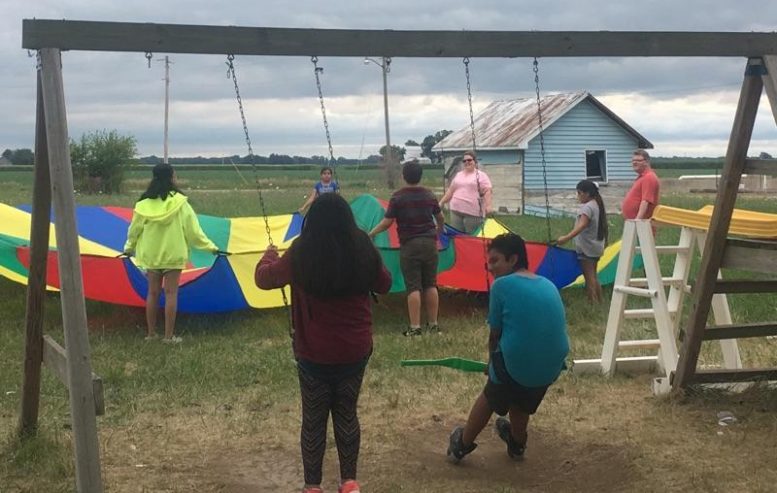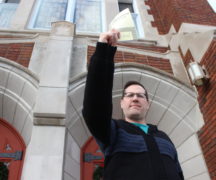By JAN LARSON McLAUGHLIN
BG Independent News
Local migrant workers came in from the pickle fields Sunday so local residents could assure them their toiling in the fields is appreciated.
Nearly 90 migrant workers and their children were treated to food, given clothing, and exchanged stories with members of First Presbyterian Church of Bowling Green.
The annual event, at a Wood County farm, is a time for sharing a meal and stories.
“People were really appreciative of everything,” said Beatriz Maya, who translated for those workers speaking Spanish.
“Many pointed out that they don’t feel welcome where they work,” Maya said. “It’s extremely important for them to see that in spite of the national rhetoric, the local communities are very appreciative of farm workers. It’s so important for the families to feel appreciated.”
Members of the church brought many boxes of clothing for the men, women and children, plus shoes, towels and sheets.
“They were waiting when we got there,” church member Debbie Zappitelli said. “They were so excited to pick up the items.”
Members of the Brown Bag Food Project also attended, bringing food for each family. And Wood County District Public Library provided books for the children and adults.
Church members brought games, soccer balls, cornhole sets, and a giant parachute.
“It was like they had an evening to play,” Zappitelli said.
The number of migrants attending this year was estimated at 90.
“The families all came together,” she said. “The need was twice the need of prior years.”
Long tables were set up for migrant families and church members to join in a meal of donated pizza and doughnuts.
“They were so gracious, so grateful,” Zappitelli said. “We wanted to thank them for the harvest and all the hard work they do.”
The migrant workers came from the U.S, Mexico and Guatemala. Many will leave Wood County soon to head to Michigan where they will pick apples, then back south to harvest tomatoes, grapefruit and oranges.
After the meal, some of the migrant workers told their stories. Maya interpreted for those who did not speak English.
“Everyone who spoke said no one had done anything like this for them,” Zappitelli said. She was particularly touched by an older gentleman who dressed up for the event, and talked about his life.
“It was good to do, because they don’t feel welcome. They don’t feel comfortable here,” she said. “In the current climate this is even more important. I can’t imagine living and working hard toil in a country that doesn’t want you.”
Janet DeLong, who organizes the Presbyterian Church’s Deacons Shop, said about 30 boxes of clothing were taken to the migrant camp for workers to select from. This is the third year for DeLong to attend.
“I’ve always had a soft spot for migrants,” she said. “It’s just dear to my heart. They work hard to give us reasonably priced food.”
Bob Vincent, also a member of the church, said farm labor from Mexico and Central America is essential for U.S. agriculture.
“They’ve really kept the farmers in business,” Vincent said. “All the vegetables and fruit on our table are here because of these people.”
Vincent noted the change in the political climate toward migrant workers.
“These are perilous times for them,” he said.
The annual migrant camp visits have benefitted the church as well, Vincent said.
“It’s made our church stronger,” he said. “God’s working through all of us.”





